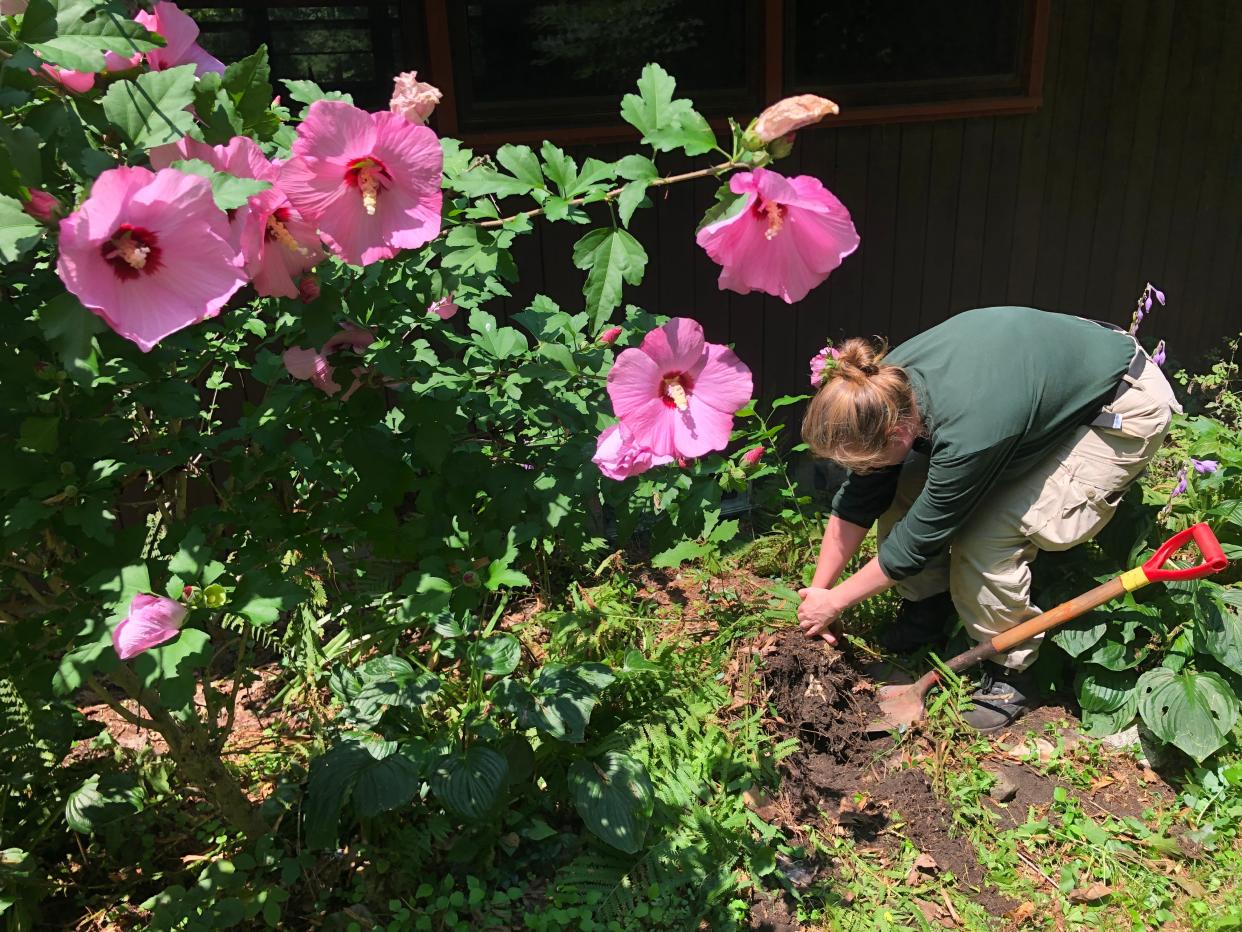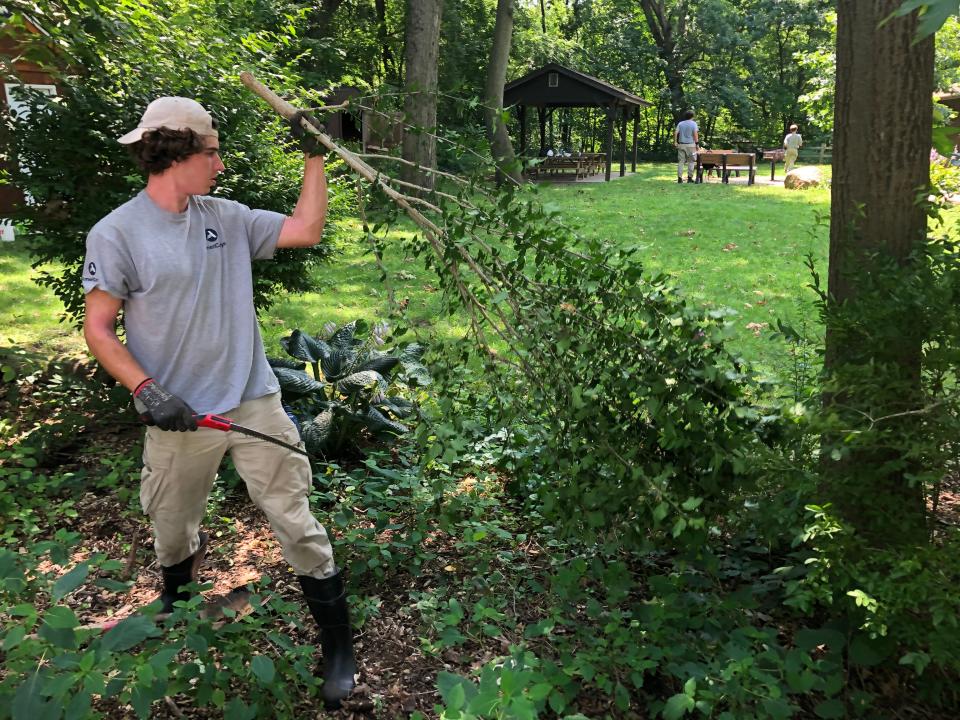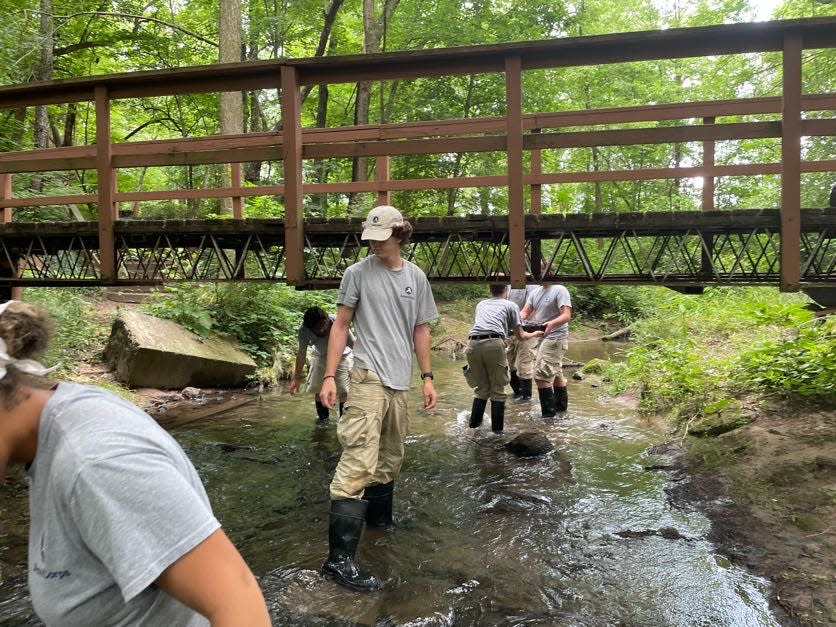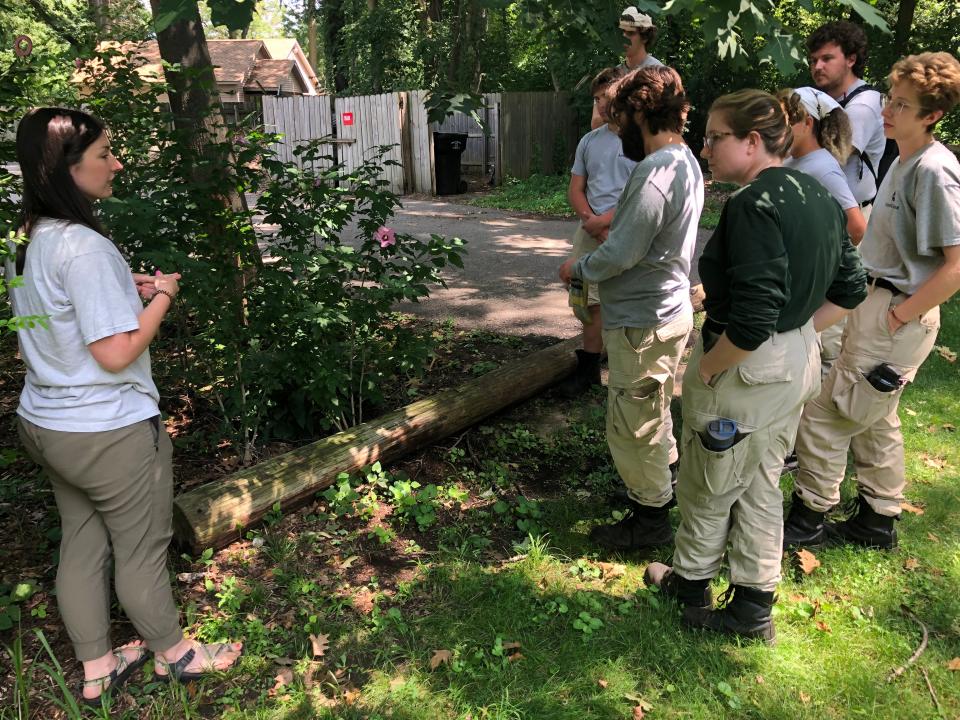AmeriCorps team tackles invasives, projects at Mishawaka Res and parks

In their first week, seven AmeriCorps members from around the country pulled and chopped down an estimated 8,000 invasive plants at The Mishawaka Res nature reserve.
“It was almost like we clear-cut the underbrush,” team leader Naomi Brown of Ohio says of the honeysuckle and bittersweet that they focused on in one part of the woods.
It shows how thick — and what a headache — such invasive species have been for several years at the only free, public woods in the city of Mishawaka, with two miles of trails, a creek where steelhead visit and cabins and youth camp sites.
In the eight weeks total that the young team will be at The Res, until Sept. 8, they may clear nearly 40,000 invasive plants, Ranger/Director Kiera Johns says. That will make a dent but won't clear all of the invasives.

On Monday, they attacked rose of Sharon, a shrub with large, lovely flowers that just started blooming in recent weeks. Native to China and India, rose of Sharon is considered invasive in some states, including Kentucky, but not in Indiana. Still, it drops tiny seeds that propagate into lots of new plants around them, and they’ve been known to pop up elsewhere.
Johns showed the team how to identify the plant, some of which were purposefully planted many years ago along the ranger’s house.
So, team members learn species one at a time. A member points to another plant: Is this poison ivy? No, it’s English ivy, a ground cover that can be problematic, too.
Prior rangers and volunteers have fought the war against the prolific invasives at The Res for years, hoping to bring it back to a more native look. Johns, a 25-year-old Mishawaka native who became the ranger last November, spent three months applying to bring this National Civilian Conservation Corps here, saying, “Since I’m the only employee, it’s difficult to maintain a healthy forest with 23 acres.”
With her bachelor’s degree in environmental studies from Butler University, Johns was aware of the Civilian Conservation Corps since she herself had served in AmeriCorps from 2020 to 2022. She’d worked in urban forestry in Knoxville, Tenn., and in vegetation management in the Great Smoky Mountains National Park.
The National Civilian Conservation Corps is a part of AmeriCorps that sends a crew to a specific location for eight weeks, and its members do four rounds of these for a total of eight months. In exchange, they get room, board, a small stipend and financial aid for college.

“I knew I wanted to do something with my hands and to kick the can down the road about what I wanted to do (with my life),” says Christian Wilson, 21, of the San Francisco area, noting how it's a great way to travel and learn about the country — he was in Vermont earlier this year repairing trails.
The crew will do much more than deal with plants at The Res.
They’ve already cleared one overgrown campsite and will clear five more, all of which were inaccessible. The Res has 11 total camp sites that can each host a handful of tents, all for Scout or youth groups, though only five had been usable. Only two to three groups rent camp sites each month, but Johns hopes they’ll be more popular once the public sees the improvements — or even learns about The Res.
She finds that some Scout and youth groups still don’t know it exists. No matter that The Res started as a Boy Scout reservation in 1920, now run as a public park by a nonprofit organization.
The team has also refinished the decks on two cabins where groups can bunk, including one where they are lodging. They’ll demolish two old shacks, clear vegetation along the property fence, maintain trails and help with events.
Their secondary assignment is to help the Mishawaka city parks. They spent last week clearing invasives and pruning plants along the Riverwalk.

Many of the team members are trying to find their next step in life.
Brown, 30, who’s in her second year with AmeriCorps, is breaking off from her prior career in higher education. She likes living a while at The Res, where she hears the hum of Capital Avenue traffic but, she says, “It really feels like you’re out in the woods.”
∎ The Mishawaka Res: The Res is open to the public from sunrise to sunset daily. Admission is free. The Res is southeast of Lincoln Way East and Capital Avenue at 13950 Scout Lane, Mishawaka. Follow small brown signs from Lincoln Way just east of Capital Avenue. (574-259-1850, mishawakares.org)
Paddle marathoners
They paddled through the dark of night for 120 miles. And local canoe racer Matt Meersman and his new racing partner, Weston Willoughby, a Traverse City firefighter, took fifth place in the 75th running of the AuSable River Canoe Marathon over the weekend.
You may recall my column two years ago after Meersman and racing partner Jorden Wakeley of Grayling, Mich., powered to first place in record-breaking time in this prestigious race that’s well known in the northland and Canada.
Aug. 4, 2021: South Bend paddler, teammate race canoe 120 miles through night and beat record
But this year brought a record 108 teams (compared with 83 in 2021) to paddle from Grayling east to Oscoda at the shore of Lake Huron. When Meersman isn’t training on the St. Joe River, he’s director of the St. Joe River Basin Commission.
Learn more about the race and results at www.ausablecanoemarathon.org.
Look and learn
∎ Learn about Little Calumet: Hear about the history and restoration of the East Branch of the Little Calumet River in a virtual gathering at 7:30 p.m. EDT Aug. 3 with the Northwest Indiana Green Drinks. This informal discussion will host speakers Dan Plath, who directs resource management at Indiana Dunes National Park and is a founder of the Northwest Indiana Paddling Association, and Rob Albrect-Mallinger, NWIPA’s “blueways steward.” Find a Zoom link to the meeting embedded in text of this column online.
∎ Bug Night: Join a hands-on celebration of insects from 6:30 to 8:30 p.m. Aug. 4 at Cobus Creek County Park, 30680 County Road 8, Elkhart. Displays will feature a variety, from dragonflies to diving beetles. There will be a bug-digging station, butterfly gardens, an aquatic invertebrate aquarium, bug catching with nets in the prairie, crafts, a reading station and chocolate-covered crickets to taste. Cost is $5 per vehicle.
∎ Meteors at Bendix: Bendix Woods County Park in New Carlisle will host a Perseid meteor watching party from 9 p.m. to midnight Aug. 11 on the park’s Carlisle Hill, with marshmallows provided at a campfire. Cost is $5. In case of clouds, the backup date will be Aug. 12. Register by Aug. 9 at 574-654-3155.
Find columnist Joseph Dits on Facebook at SBTOutdoorAdventures or 574-235-6158 or jdits@sbtinfo.com.
This article originally appeared on South Bend Tribune: AmeriCorps team helps Mishawaka Res parks on invasive species projects

